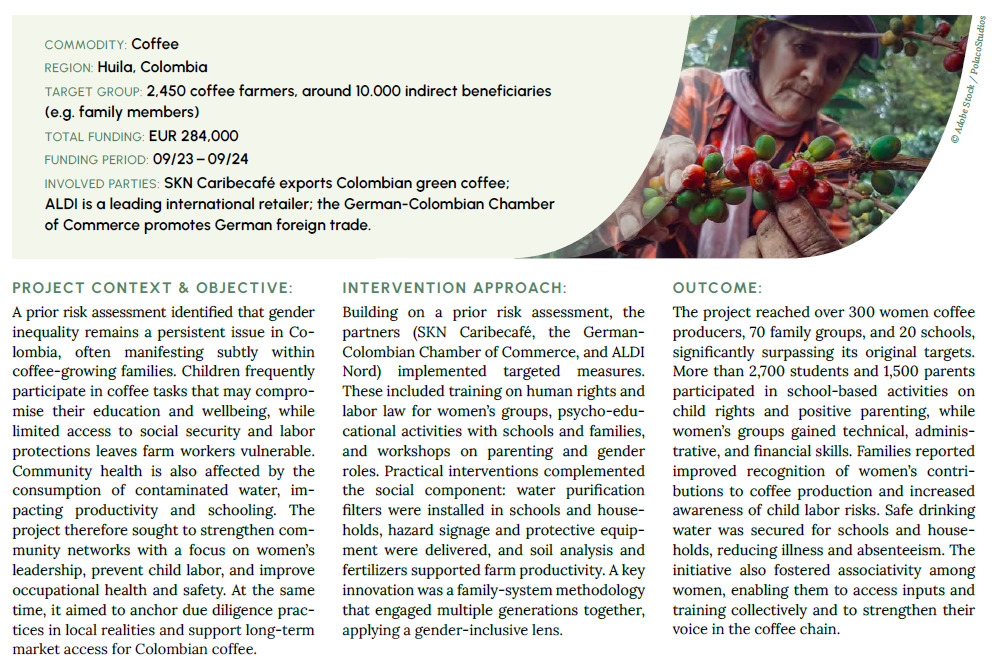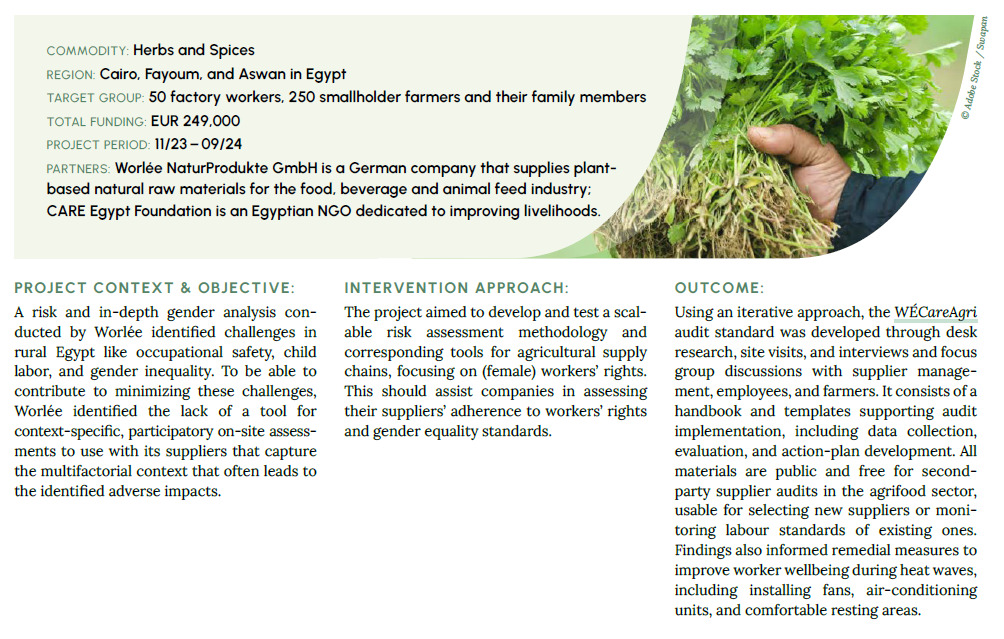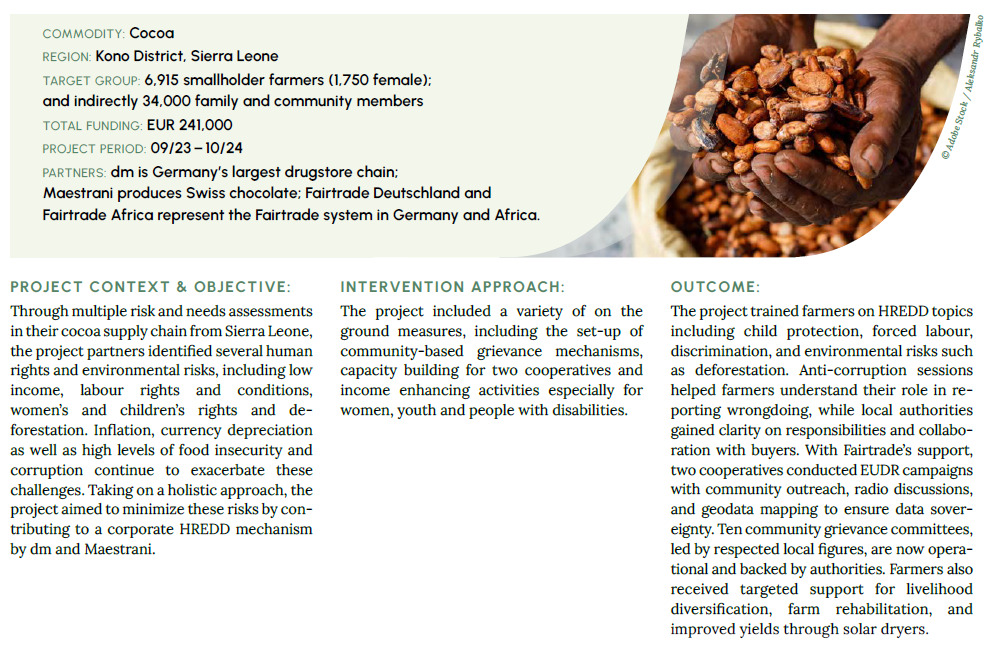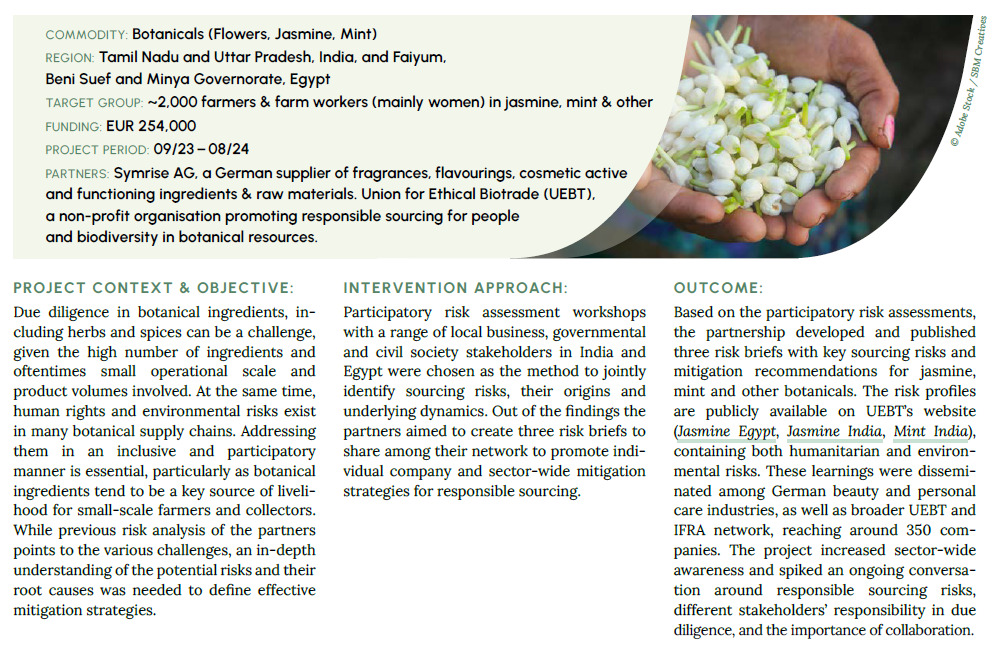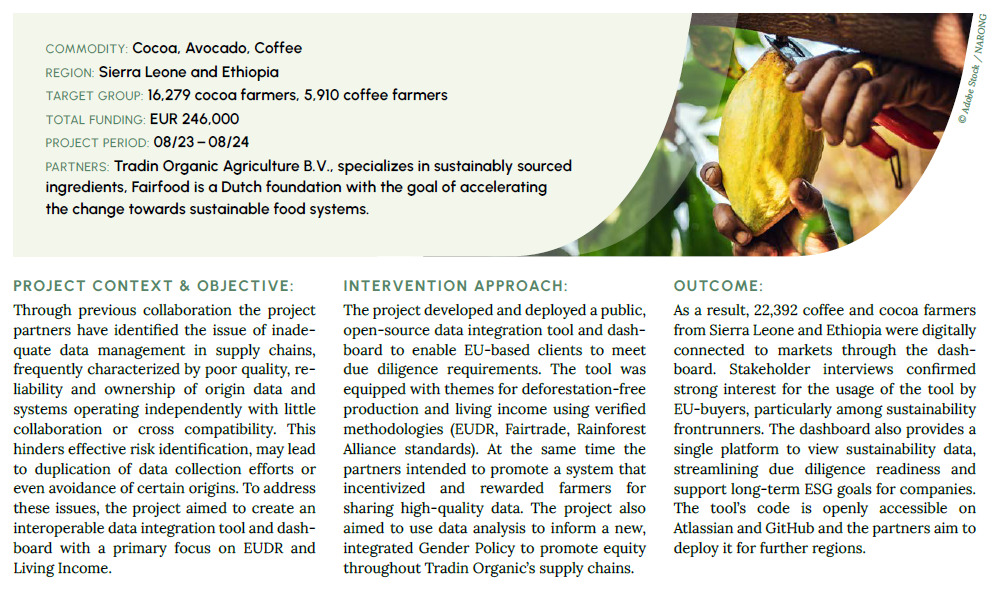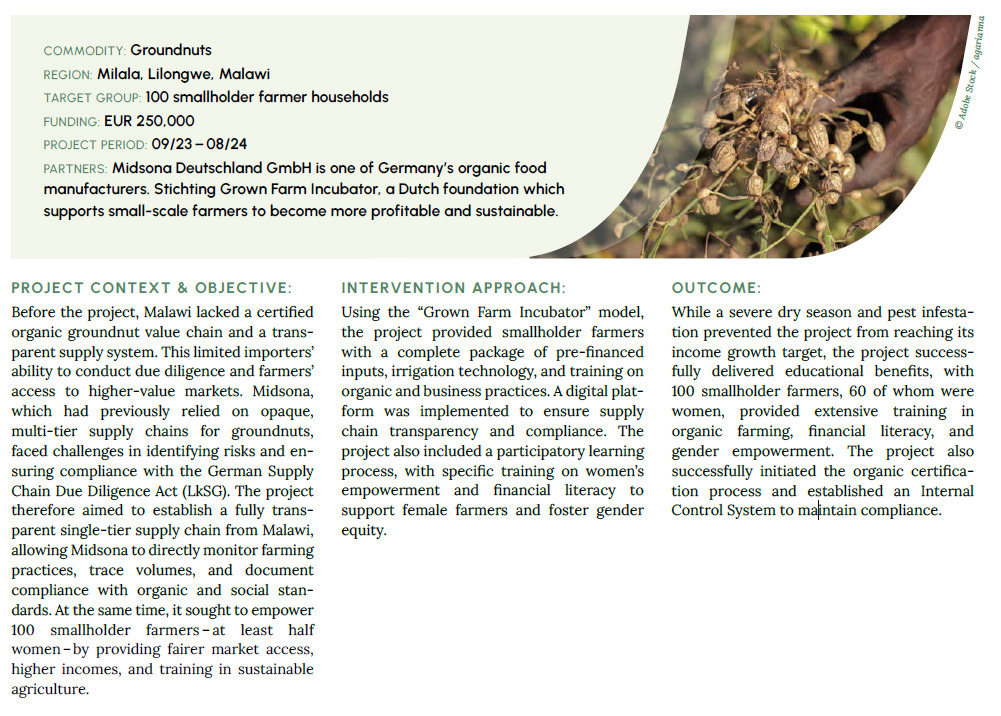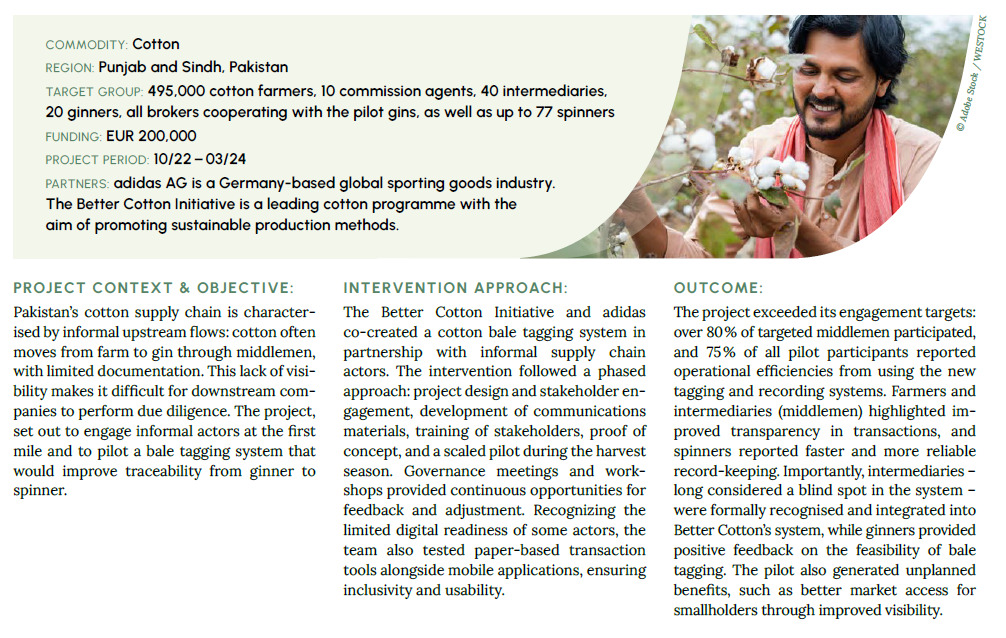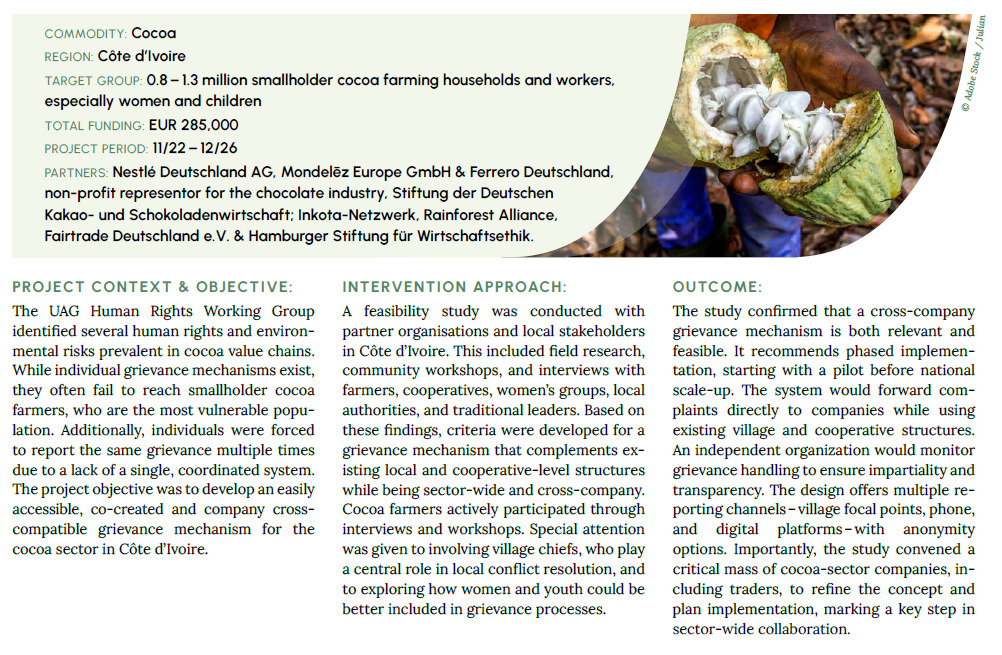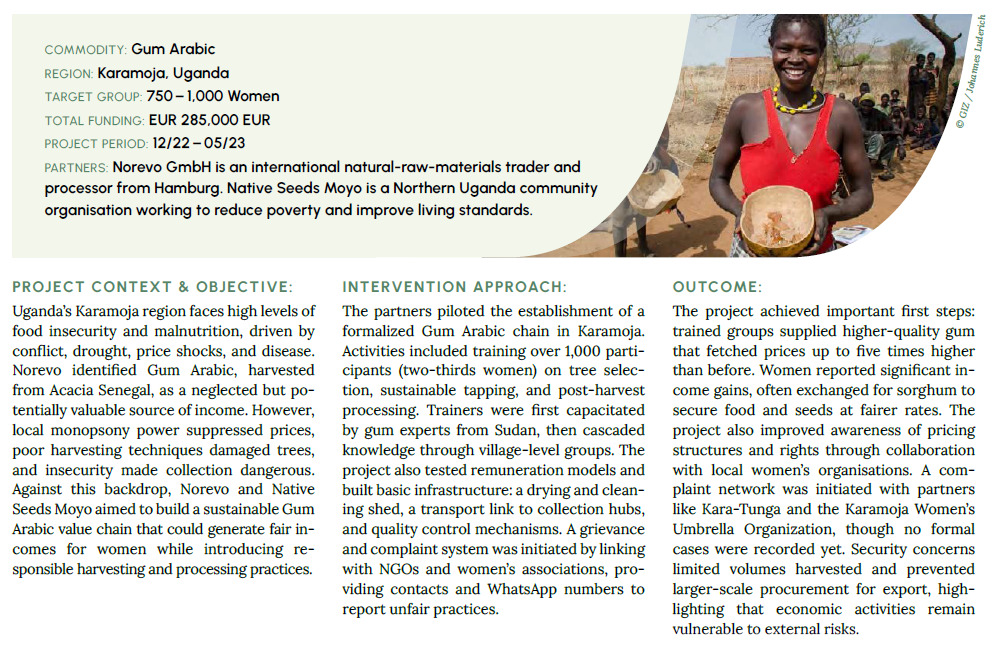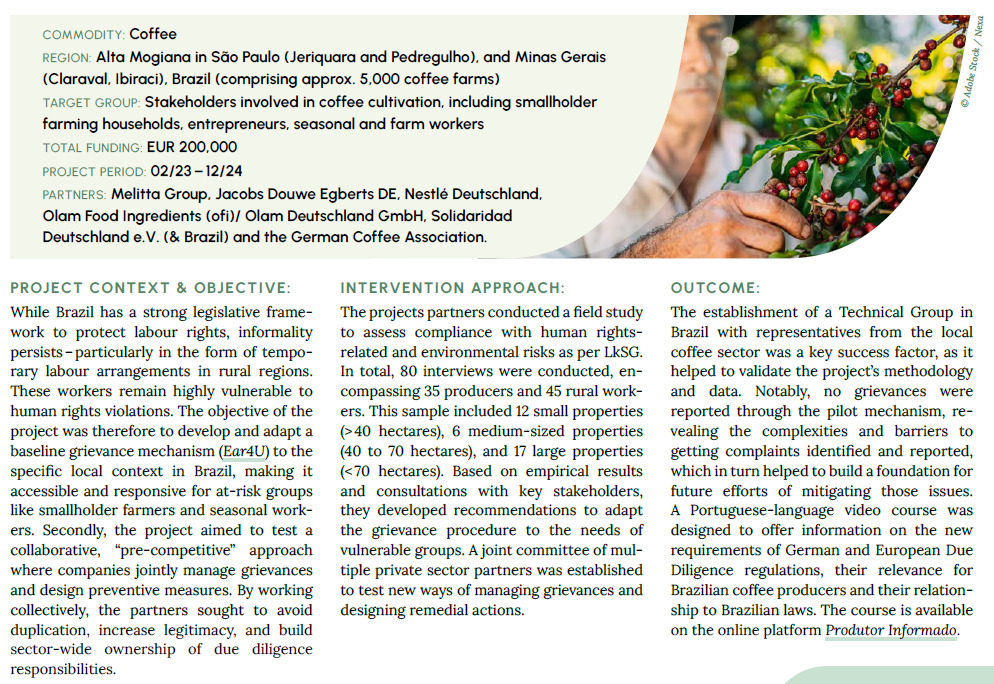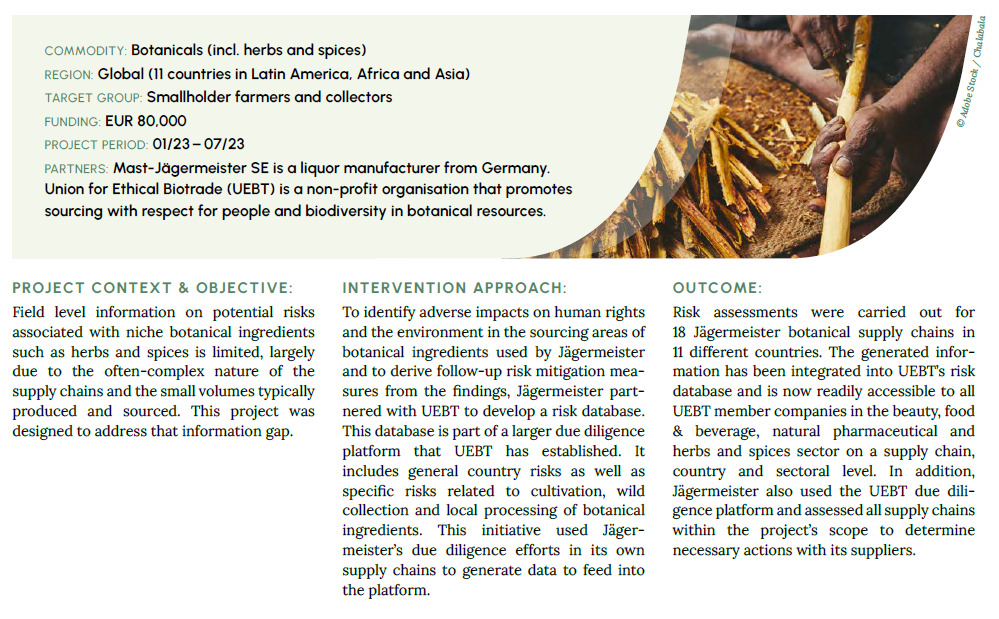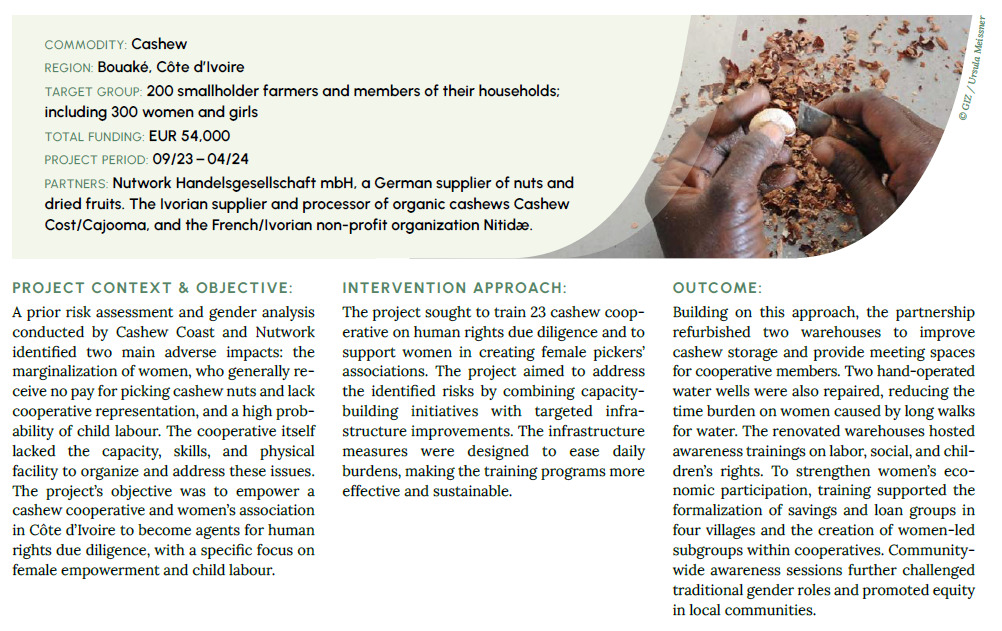- Funds & Projects
- Due Diligence Fund
- Funded projects
Funded projects
A total of 13 promising projects were selected from two rounds for funding by the Due Diligence Fund (DDF), which are implemented by one or more private-sector actors in cooperation with one or several public-benefits partners. More details about the currently funded projects can be found here.
Round 3
Commodity: Coffee
Region: Uganda, Greater Masaka region
Target Group: 1250 Famers
GIZ Funding: EUR 123,000
Partner Funding: EUR 52,030
Project Period: 07/2025 - 12/2026
Implementing Parties:
Wakuli is a Netherlands based specialty coffee company;
Ndugu Farmers Limited invests in transforming associated coffee cooperatives into social enterprises in Uganda.;
Fairfood International is a non-profit organization promoting fair food systems.
Project Description
Uganda's coffee sector faces significant socio-sustainability challenges. The most prevalent of these systemic challenges are related to fair business practices, human and labour rights, and environmental impact. Compounding effects associated with climate change, market volatility, gender inequality, child labour, and low wages exacerbate poverty among farmers.
This innovative project aims to improve the livelihoods of 1,250 Ugandan coffee farmers by implementing digital traceability, living income pricing, and data-driven interventions. By integrating Fairfood’s Commodity Living Income Strategy, the project will calculate true production costs to ensure fair compensation and responsible procurement practices. Ndugu will lead digitization and data collection, empowering farmers with insights to strengthen their bargaining power.
Key activities include developing a data assessment methodology aligned with living income goals, digitizing and onboarding farmers for data collection using low-cost digital tools and analysing data to calculate living income prices. The project will then design and implement targeted interventions based on these findings. Communicating the results to enhance consumer and industry awareness about living income is a critical component of the knowledge-sharing aspect of this project.
Commodity: Cocoa
Region: Sierra Leone, Kono District
Target Group: 2,500 cocoa farmers direct, 15,000 indirect beneficiaries (families and community members)
GIZ Funding: EUR 123,000
Partner Funding: EUR 123,000
Project Period: 10/2025 – 12/2027
Implementing Parties:
dm-drogerie markt is a leading German retailer; Maestrani Schweizer Schokoladen AG is a Swiss chocolate manufacturer; Fairtrade Germany is the national Fairtrade organization for Germany; Fairtrade Africa represents Fairtrade certified producers in Africa and the Middle East
Project Description
For many smallholder cocoa farmers in Sierra Leone, low crop productivity, limited access to finance, susceptibility to climate change, and gender inequality perpetuate persistent poverty. Without targeted support and structural reform, these communities risk repeated cycles of vulnerability.
Building upon previous DDF-funded efforts, this project seeks to strengthen long-term structures that empower farmers and embed fair purchasing principles across the cocoa value chain. It will support cocoa farmers in moving toward a living income by piloting Responsible Purchasing Practices (RPPs), in the dm–Maestrani supply chain, while implementing farm-level interventions that strengthen income security, gender equity, and climate resilience.
The project will develop and test a practical guide to RPPs, aligned with the Living Income Reference Price framework. At the community level, the initiative builds gender-responsive structures by supporting women’s leadership and establishing gender policies within producer organizations. It expands Village Savings and Loan Associations (VSLAs) to increase financial literacy and access, particularly for women and youth. Climate-smart training and post-harvest practices will enhance productivity and resilience. By integrating procurement with grassroots capacity building, the project lays the foundation for a more inclusive and sustainable cocoa sector.
Commodity: Coffee
Region: Uganda, Eastern and Western Region / Bududa, Bulambuli and Bushenyi
Target Group: 1,500 households, approximately 7,500 cooperative members and relatives in the supply chains of ACPCU and MEACCE
GIZ Funding: EUR 80,000
Partner Funding: EUR 40,000
Project Period: 07/2025 – 12/2026
Implementing Parties:
Germany-based GEPA mbH and Belgium-based Oxfam Fair Trade are well-known Fairtrade importers specialized in food products; Ankole Coffee Producers Cooperative Union Limited (ACPCU Ltd.) and Mt Elgon Agroforestry Communities Cooperative Enterprise (MEACCE Ltd.) are Ugandan coffee producer cooperatives
Project Description
Despite the parties’ Fairtrade certification and, beyond that, their longstanding commitment against child labour over decades, it remains a risk for smallholder coffee farming communities in Uganda. Driving factors include poverty, low productivity, insufficient educational infrastructure, lack of awareness, and socio-cultural norms. These root causes are complex and intertwined and have been addressed by the parties through different approaches in the past. Though they are successful, meaningful and sustainable progress is only possible with community-wide awareness of the harmful impact of child labour.
This project seeks to strengthen child rights in coffee-growing regions of Eastern and Western Uganda. It will do so by focusing on awareness creation among farming families and conducting trainings to foster a clear distinction between child work and child labour, emphasize the risks of child labour, and empower children to understand their rights.
The coffee cooperatives ACPCU and MEACCE and their supply chains are at the heart of this project. Using their extensive networks and the primary schools in the regions they operate, the project will drive behavioural change among coffee-producing families through change agents, including an innovative peer-group approach involving children – for example by creating child rights clubs within schools – and young people as change agents. Critical to these endeavours is engaging farming families on the difference between child work and child labour, the risks of child labour, and children's rights. By enhancing community understanding and leveraging trusted local structures, the project aims to sustainably reduce the risk of child labour and contribute to strengthening human rights in the communities.
Commodity: Coffee
Region: Honduras, Santa Barbara and Copan
Target Group: 1200 smallholder coffee farmers
GIZ Funding: EUR 123,000
Partner Funding: EUR 123,000
Project Period: 07/2025 – 12/2026
Implementing Parties:
Hamburg Coffee Company Hacofco mbH is an EU-based coffee trader; Confianza SA-FGR is Honduras’ first loan guarantee fund administrator; The Alliance of Bioversity International and Centro Internacional de Agricultura Tropical (CIAT) is an international research organization focused on agricultural science
Project Description
Small and dispersed coffee producers in Honduras face barriers to formal and international market inclusion, including high costs and complexities associated with regulatory compliance and a lack of access to affordable traceability tools and financial services. Information asymmetry, coupled with financial exclusion and perceived lending risks, are challenges that are incompatible with sustainable livelihoods.
This project tests the interoperability of EUDR-compliant public digital infrastructure with Honduras' financial system, allowing financial institutions to leverage traceability data for risk assessments and loan provision. This collaboration will demonstrate a real world example of EUDR compliance through data and due diligence assessment, registered with EU traces and potential controls through competent authorities. By improving creditworthiness assessments and creating tailored credit products, finance will be made more accessible to farmers often excluded from formal systems. By leveraging trusted intermediaries and aligning compliance with financial incentives, it aims to create a scalable model for responsible sourcing and inclusive financing.
Alongside piloting interoperability and designing an inclusive financing mechanism, this project will also conduct gender-sensitive ethnographic research and ensure new systems reflect trade relationships without disrupting existing trust-based networks. By aligning environmental compliance with financial inclusion, the initiative offers a rights-based model for implementing due diligence that strengthens both livelihoods and supply chain transparency.
Commodity: Rice
Region: Pakistan: Punjab and Sindh Province
Target Group: 1,652 small-scale farming families
GIZ Funding: EUR 85,700
Partner Funding: EUR 87,000
Project Period: 07/2025 – 12/2026
Implementing Parties:
Mars Food Europe CV, a European subsidiary of Mars Inc.; Rice Partners Ltd (RPL) is a Pakistani agriculture company; 60 Decibels, Inc. is a US-based end-to-end social impact measurement company
Project Description
Like many other rice-supplying countries, the Pakistani rice production industry continues to face a range of human rights and environmental challenges linked to labour practices, gender disparities, and unsustainable pesticide and water use. While these issues are recognised as being systemic, they are often underreported due to concerns of retaliation and a lack of confidential reporting channels for workers. Because of this, existing audit tools may not always capture sensitive risks.
This project aims to address this gap by creating a scalable, rights-holder-centric methodology for human rights risk assessment. This methodology will look to amplify farmer voices and make hidden risks visible, using innovative tools like HRDD pulse surveys and List Experiments. It aims to support corporate compliance and to promote safer, more equitable supply chains.
During the project period, the methodology will be developed and piloted in the implementing parties supply chain. Using rapid pulse surveys and list experiments, the project will collect high-fidelity, rights-holder-informed data by conducting surveys with Pakistani rice farmers. The methodology and findings will be designed to serve a broad range of similar stakeholders and supply chains beyond the immediate project partners, providing agri-food companies with an open-source, scalable solution for conducting HRDD in complex supply chains. Insights generated through this research will inform capacity-building activities and be shared via platforms such as the Sustainable Rice Platform to encourage uptake of the methodology and to draw attention to gender-specific risks.
Commodity: Rice, Pulses
Region: Cambodia, Dispersed
Target Group: 9,943 Farming community members
GIZ Funding: EUR 122,899
Partner Funding: EUR 149,900
Project Period: 07/2025 – 01/2027
Implementing Parties:
Midsona Deutschland GmbH is a German organic food company; IBIS Rice Conservation Co., Ltd (IRCC) is a Cambodian social enterprise focused on organic rice and wildlife conservation.
Project Description
While significant strides have been made to improve Cambodia's rural agricultural sector, particularly in rice farming, the industry faces several socio-economic and human rights challenges. Key risks include the prevalence of child labour due to seasonal demand and a lack of mechanization, income instability for farming families who are primarily reliant on a single crop, and the informality of the sector, which leads to a lack of social and economic security.
Building on their long-standing partnership, Midsona and IBIS Rice aim to integrate a human rights and living income action program into the existing compliance supply chain. The goal is to enhance social sustainability through the development of a rural living income benchmark for the region, based on previous studies of human rights dynamics and living income in rural Cambodia.
This innovative project will assess human rights and gender-related risks through community-centred research. Based on the findings from primary data collection, the project will develop tailored action plans and interventions that focus on improving social standards and increasing transparency, as well as enhancing farmer well-being. The project seeks to create a replicable model for ethical sourcing and enhance the resilience of Cambodian rice farmers.
Commodity: Cocoa
Region: Togo, Plateaux region
Target Group: 1,652 small-scale farming families
GIZ Funding: EUR 90,000
Partner Funding: EUR 60,000
Project Period: 07/2025 – 12/2026
Implementing Parties:
gebana AG is a Swiss-based fair trade company; gebana Togo is its Togolese subsidiary; Action Centre for Rural Development (CADR) is a public-benefit organisation; Espoir and Vision+ are cocoa farmer cooperatives in Togo.
Project Description
The implementing parties have identified room for several improvements in their Togolese cocoa supply chain. Currently, cross cutting risks, such as child labour, school attendance, and gender have been identified as key intervention spaces. In addition, the satellite imagery of currently available traceability systems are deficient in their ability to distinguish between natural forests and the agroforestry regimes used for cacao production, which undermines deforestation-free sourcing claims.
The project aims to comprehensively understand EUDR-related risks for smallholder cocoa farmers in Togo and implement innovative mitigation measures for deforestation, land, labour, and child rights, integrating them into Gebana’s operations.
Principally, activities have been devised to address two interconnected risks: deforestation and human rights. The project will enhance agroforestry management and deforestation monitoring. Supplementarily, human rights, data and mitigation activities, will be centred on a participatory human rights risk assessment to assess implementable mitigation measures. Finally, the project will involve the collection of child labour and school attendance data through focus groups, the delivery of awareness trainings, and the assessment of their impact.
Commodity: Coffee
Region: Peru, Piura and Cajamarca regions
Target Group: 2,000 smallholder members of La Prosperidad de Chirinos and Norandino cooperatives
GIZ Funding: EUR 123,000
Partner Funding: EUR 81,000
Project Period: 07/2025 – 12/2026
Implementing Parties:
Cafedirect plc is an independent, UK-based coffee social enterprise and B Corporation; Cooperativa Agraria Norandino and Cooperativa Agraria Cafetalera La Prosperidad de Chirinos are independent Peruvian coffee producer cooperatives; Producers Direct is a UK-based charity.
Project Description
The cost of compliance-related data collection for novel regulations like the EU Deforestation Regulation (EUDR) disproportionately burdens smallholder farmers and cooperatives. The increased cost for data collection places cooperatives at risk of defaulting on contracts and reallocating limited funds away from vital farmer services. Compounding burdens like supply chain resilience and security are also major risks, with climate change threatening coffee-growing areas and farmer incomes, and often disproportionately impacting the livelihood of women.
This project aims to drive data-informed targeted investment in farmer service delivery and ultimately increase farmer incomes and resilience. To do so, the project partners will develop and test best-practice methodologies and infrastructure for collecting, sharing, and aggregating compliance-related data for Due Diligence, Certifications, and EUDR compliance, using existing digital public infrastructure and open-source tools.
Three interconnected activities will be pursued. Firstly, the project will establish data infrastructure and governance, documenting best practices for collecting and sharing data, creating gender-disaggregated farmer profiles to enhance advisory services. Secondly, delivery of data-driven insights, developing dashboards and analysing data with a gender lens to improve smallholder advisory services and inform supply chain investments. Finally, the project will focus on scalability and knowledge sharing, developing a roadmap for expanding this approach across the coffee sector and disseminating learnings for systemic improvements in human rights due diligence.
Commodity: Multi-crop value chains of spices
Region: Nepal. Regions: Palpa (mid-hills) and Humla/Dolpa (mountainous)
Target Group: 400 smallholder farmers
GIZ Funding: EUR 120,000
Partner Funding: EUR 130,000
Project Period: 07/2025 – 12/2026
Implementing Parties:
Mast-Jägermeister SE is a German beverage company, Kräutermühle GmbH is a German organic food company. aQysta BV and aQysta Nepal are agriculture technology/supply chain companies. Himalaya Agroecology Research & Development (HARD).
Project Description
Nepal is ranked 4th globally for vulnerability to climate change, which causes extreme weather events that amplify all other risks; income insecurity and low wages are driving massive male out-migration, leading to rural abandonment. Additionally, significant gender inequality persists, with 80% of female farm workers earning 25% less than their male counterparts and facing larger burdens.
The project is designed to demonstrate that a multi-crop value chain strategy can successfully establish socially and environmentally responsible production systems in Nepal. This strategy will support farmer living income and climate resilience while simultaneously reducing due diligence costs for business partners like Mast-Jägermeister SE and Kräutermühle GmbH.
The proposed solution focuses on 400 smallholder farmers of which at least 80% will be women. The project seeks to integrate multiple crops into a single value chain and due diligence framework. This model not only provides farmers with diverse, resilient income streams to withstand climate and market volatility but also allows companies to share due diligence efforts and costs across different product categories. This approach will streamline compliance with evolving regulations and offer a cost-effective, long-term pathway for ethical sourcing.
